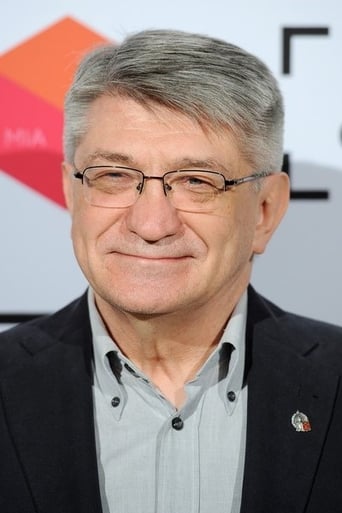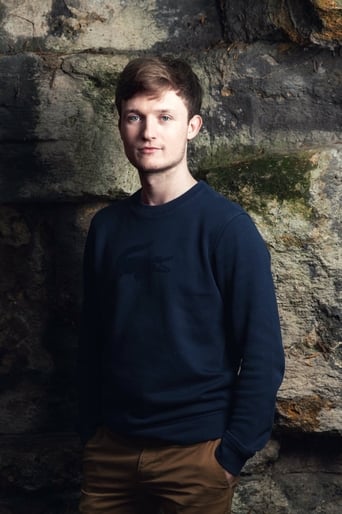Smartorhypo
Highly Overrated But Still Good
Spidersecu
Don't Believe the Hype
BallWubba
Wow! What a bizarre film! Unfortunately the few funny moments there were were quite overshadowed by it's completely weird and random vibe throughout.
Senteur
As somebody who had not heard any of this before, it became a curious phenomenon to sit and watch a film and slowly have the realities begin to click into place.
treywillwest
A spectacular and unique essay film. At once a philosophical rumination on the connection between art and power, a history of the Louvre- particularly during the Vichy regime, and a surprisingly powerful and human narrative of the French civil servant and German aristocrat and Nazi officer who collaborated to save the collection from plunder. Unflinchingly, the film equates art with plunder. As any serious study of the Louvre must, by definition, be this is a tale of Napoleon, invasion and imperialism. The Emperor is himself a character in the film, haunting the halls of his museum and reminding the director/narrator that all of the paintings are of him, for none of it would be there without his power. The point is also made that Paris was sparred the devastation of the war in no small part because the leading Nazis loved classical art and wanted the Louvre's collections for Germany and themselves. In a real sense, then, the film must uneasily acknowledge, the German regime was responsible for the preservation of much European cultural treasure. The Louvre, though to a degree the very phenomenon of the art museum, is made to seem like a place where humanism, the preservation of the human image, and sheer political force, come together. Sukarov's imagery is characteristically spectacular. The amazing, painterly light that he most often brings to the human face he here brings to the urban face of Paris. This film includes some of the best uses of crane shots that I think I've ever seen.
billmarsano
Sometimes what we've seen before is enough. Director/ Writer Aleksandr Sokurov, who did so well with 'The Russian Ark,' a seamless, one-long- take tour of the Hermitage, does fails heavily with the Louvre. The computerized opening is mere gadgetry; a sour Napoleon brags about the art he stole for the Louvre; Marianne, the personification of France, appears serially, glumly droning Liberté, Égalité, Fraternité rather too often. Earlier Mariannes (e.g. Bardot, Deneuve, Casta) were at least lookers. Too much time is spent on stuff long-since covered by 'Monuments Men' and at least one TV documentary on the Nazi occupation and art looting. As nothing new is added, 'bored stiff' will have a literal meaning unless your theater has really good seats.
Paul Allaer
"Francofonia" (2015 release from France; 90 min.) is a non-fiction movie loosely about the Louvre museum in Paris. As the movie opens, we hear a certain Alexander (that would be the movie's Russian director Alexander Sokurov) in conversation with a certain Dirk, who is on an ocean liner with art in one of its containers. It's not long before Sokurov directs his attention to June 14, 1940, when German troops overtook Paris, including archive footage of Hitler inspecting the Eiffel Tower and muttering "Where is the Louvre?" Eventually, we are introduced to Jacques Jaujard, the Louvre's museum director at that time, and Count Metternich, entrusted by Hitler to supervise the Louvre's art collection for the Nazis. At this point we're not quite 15 min. into the movie, but to tell you more would spoil your viewing experience. You'll just have to see for yourself how it all plays out.Couple of comments: this is the latest oeuvre from writer-director Aleander Sokurov, best know for "Russian Ark" (about the Hermitage in St. Petersburg). In fact it can be said that "Francofonia" is a spiritual sequel to that movie. Going in, I knew that "Francofonia" was about the Louvre, but didn't know more than that. And while it is true that the movie's primary subject matter is the Louvre, it is in equal measure about the WWII occupation of Paris by the Germans, and a bunch of other things as well ("why are portraits so important in European culture, whereas they are non-existent in the Muslim culture?", asks Sokurov). Even while it's not always clear what the ultimate aim or direction of the movie is, that's not a problem for me. The only jarring thing for me was the occasional and unnecessary appearance of actors impersonating Napoleon (whom we see staring at the Mona Lisa, while repeating "C'est moi!") and France. And oh yea, we do get to see a bunch of paintings and other works of art from the Louvre. In the end, I was surprised how quickly the 90 min. had flown by, so while this movie is rather strange, it certainly is intriguing and held my attention.This movie made quite a splash at the 2015 Venice Film Festival. "Francofonia" opened without any pre-release fanfare or advertising at my local art-house theater here in Cincinnati a week ago, and the Thursday early evening screening where I saw this at was one of its last, as the movie was gone the next day. I was frankly surprised how many people there were (about 10), but maybe they had the same thought as I did (better see this before it's gone!). If you are in the mood for a deeply subjective non-fiction film (but don't call it a documentary) about the Louvre, I'd readily suggest you check this out.
JPfanatic93
Francofonia is an intriguing compendium piece to Sokurov's breakthrough film Russian Ark, though it lacks the stylistic punch of that particular film. Of course, doing another 100-minute one-take shot would have felt repetitive, as if the director attempted to capitalize on his own past glory. So there's none of that in Francofonia, but that's not to stop Sokurov from pulling a few more cinematographic tricks out of his hat. That, and the overall message, matters more to him than following conventional narrative expectations. Which is made clear a bit painfully, as Francofonia is literally all over the Louvre, rather than sticking to the single time frame that one would have expected to be the primary focus. Even though the museum's survival of the war years during WW II appears to be the subject at hand, Sokurov has a lot more to tell about the place's long history, not to mention sharing his personal thoughts on both the Louvre's background, its place in art history and the treatment of art in general. That's a lot to tackle for a 90-minute movie...And of course, as a result, not every episode of the Louvre's story proves as interesting. In fact, all of the film suffers from Sokurovs tendency to change subjects, drone on about the abuse and capitalization of art works and sudden jumps to different time periods. Nevertheless, the message remains clear: museums should not be reduced to pawns of commerce, politics or dictators. They are time capsules that tell all of human history and should be carefully preserved, kept well away from the power hungry. The German occupation is just an example of and an homage to a period in history where the joining of forces between two like minded men, who by all accounts ought to be diametrically opposed, preserved countless artifacts for posterity. Sokurov thanks both men for their assistance to cultural history. But he also isn't afraid to remind us that the origin of the Louvre itself is steeped in conquest and theft. After all, the emperor Napoleon captured many pieces of art on his campaigns abroad and had them shipped to the capital of his empire. Hitler simply attempted to do the same and failed in the Louvre's case, while succeeding in a lot of other cases. Art and politics certainly aren't mutually exclusive.It's a point Sokurovs makes with the help of various stylistic choices, some proved in prior works, others applied for the first time in his case. Though there are no excessively long takes used as there were in Russian Ark, his introduction of historical characters sharing their insights and motivations with us is taken straight from that film. In this case restricted to only two characters (Marianne, the French Spirit of Freedom and Napoleon), rather than many. This is not a coincidence of course, as Francofonia's main tale also deals with two characters, the museum director (representing the side of French freedom) and the Nazi officer (the conquering party, the Napoleonic figure). Their story is intercut with historical footage, while it is itself disguised as historical footage by its old fashioned framing and the many print scratches applied. It would have worked even better if it was in black and white, but apparently Sokurov disagreed. He disagrees with a lot of things in Francofonia. Like art being shipped over seas as any other piece of cargo in containers on large freighters, its very existence threatened by a violent storm. Why does art suffer so much indignity and indifference today, he laments. No matter how fragmented his thoughts as shown in Francofonia, it's hard to disagree with him, when ancient buildings and statues are demolished left and right by zealous barbarians, who are also eager to simply sell such cultural heritage to the highest bidder to fund their cause. World War II may have ended seventy years ago, but art remains ever in danger at the hands of subversive ideologies. Francofonia serves as an cautionary reminder of what could be scrapped from the history pages forever if we are not careful and respectful of art's place in our cultural mind.




